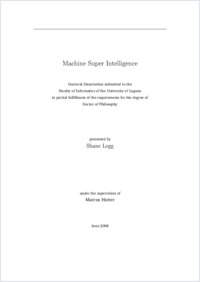Machine super intelligence
- Legg, Shane
- Hutter, Marcus (Degree supervisor)
-
17.06.2008
190 p
Thèse de doctorat: Università della Svizzera italiana, 2008
English
This thesis concerns the optimal behaviour of agents in unknown computable environments, also known as universal artificial intelligence. These theoretical agents are able to learn to perform optimally in many types of environments. Although they are able to optimally use prior information about the environment if it is available, in many cases they also learn to perform optimally in the absence of such information. Moreover, these agents can be proven to upper bound the performance of general purpose computable agents. Clearly such agents are extremely powerful and general, hence the name universal artificial intelligence. That such agents can be mathematically defined at all might come as a surprise to some. Surely then artificial intelligence has been solved? Not quite. The problem is that the theory behind these universal agents assumes infinite computational resources. Although this greatly simplifies the mathematical definitions and analysis, it also means that these models cannot be directly implemented as artificial intelligence algorithms. Efforts have been made to scale these ideas down, however as yet none of these methods have produced practical algorithms that have been adopted by the mainstream. The main use of universal artificial intelligence theory thus far has been as a theoretical tool with which to mathematically study the properties of machine super intelligence. The foundations of universal intelligence date back to the origins of philosophy and inductive inference. Universal artificial intelligence proper started with the work of Ray J. Solomonoff in the 1960's. Solomonoff was considering the problem of predicting binary sequences. What he discovered was a formulation for an inductive inference system that can be proven to very rapidly learn to optimally predict any sequence that has a computable probability distribution. Not only is this theory astonishingly powerful, it also brings together and elegantly formalises key philosophical principles behind inductive inference. Furthermore, by considering special cases of Solomonoff's model, one can recover well known statistical principles such as maximum likelihood, minimum description length and maximum entropy. This makes Solomonoff's model a kind of grand unified theory of inductive inference. Indeed, if it were not for its incomputability, the problem of induction might be considered solved. Whatever practical concerns one may have about Solomonoff's model, most would agree that it is nonetheless a beautiful blend of mathematics and philosophy. The main theoretical limitation of Solomonoff induction is that it only addresses the problem of passive inductive learning, in particular sequence prediction. Whether the agent's predictions are correct or not has no effect on the future observed sequence. Thus the agent is passive in the sense that it is unable to influence the future. An example of this might be predicting the movement of the planets across the sky, or maybe the stock market, assuming that one is not wealthy enough to influence the market. In the more general active case the agent is able to take actions which may affect the observed future. For example, an agent playing chess not only observes the other player, it is also able to make moves itself in order to increase its chances of winning the game. This is a very general setting in which seemingly any kind of goal directed problem can be framed. It is not necessary to assume, as is typically done in game theory, that the environment, in this case other player, plays optimally. We also do not assume that the behaviour of the environment is Markovian, as is typically done in control theory and reinforcement learning. In the late 1990's Marcus Hutter extended Solomonoff's passive induction model to the active case by combining it with sequential decision theory. This produced a theory of universal agents, and in particular a universal agent for a very general class of interactive environments, known as the AIXI agent. Hutter was able to prove that the behaviour of universal agents converges to optimal in any setting where this is at all possible for a general agent, and that these agents are Pareto optimal in the sense that no agent can perform as well in all environments and strictly better in at least one. These are the strongest known results for a completely general purpose agent. Given that AIXI has such generality and extreme performance characteristics, it can be considered to be a theoretical model of a super intelligent agent. Unfortunately, even stronger results showing that AIXI converges to optimal behaviour rapidly, similar to Solomonoff's convergence result, have been shown to be impossible in some settings, and remain open questions in others. Indeed, many questions about universal artificial intelligence remain open. In part this is because the area is quite new with few people working in it, and partly because proving results about universal intelligent agents seems to be difficult. The goal of this thesis is to explore some of the open issues surrounding universal artificial intelligence. In particular: In which settings the behaviour of universal agents converges to optimal, the way in which AIXI theory relates to the concept and definition of intelligence, the limitations that computable agents face when trying to approximate theoretical super intelligent agents such as AIXI, and finally some of the big picture implications of super intelligent machines and whether this is a topic that deserves greater study.
- Language
-
- English
- Classification
- Computer science and technology
- License
-
License undefined
- Identifiers
-
- RERO DOC 9503
- URN urn:nbn:ch:rero-006-108227
- ARK ark:/12658/srd1317954
- Persistent URL
- https://n2t.net/ark:/12658/srd1317954
Statistics
Document views: 2774
File downloads:
- Texte intégral: 1802
